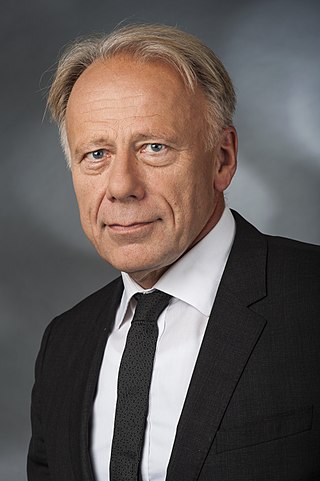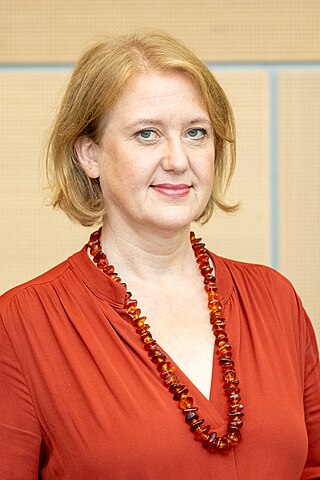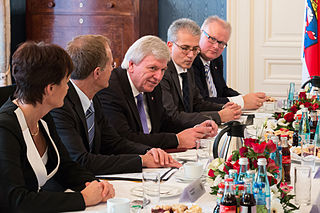
Alliance 90/The Greens, often simply referred to as Greens, is a green political party in Germany. It was formed in 1993 by the merger of the Greens and Alliance 90. The Greens had itself merged with the East German Green Party after German reunification in 1990.

Jürgen Trittin is a German Green politician who served as Minister for the Environment, Nature Conservation and Nuclear Safety in the government of Chancellor Gerhard Schröder from 1998 to 2005.
A minority government, minority cabinet, minority administration, or a minority parliament is a government and cabinet formed in a parliamentary system when a political party or coalition of parties does not have a majority of overall seats in the legislature. It is sworn into office, with or without the formal support of other parties, enabling a government to be formed. Under such a government, legislation can only be passed with the support or consent of enough other members of the legislature to provide a majority, encouraging multi-partisanship. In bicameral legislatures, the term relates to the situation in the chamber whose confidence is considered most crucial to the continuance in office of the government.

The Green Left is a democratic socialist political party in Denmark.

Holger Börner was a German politician of the SPD.

In German politics, a traffic light coalition is a coalition government of the Social Democratic Party (SPD), the Free Democratic Party (FDP) and Alliance 90/The Greens. It is named after the parties' traditional colours, respectively red, yellow, and green, matching the colour sequence of a traffic light (Ampel). So far, the only instance of a traffic light coalition on a federal level in Germany has been in Olaf Scholz' cabinet between 2021 and its collapse over disagreements in November 2024.
The politics of Hesse takes place within a framework of a federal parliamentary representative democratic republic, where the Federal Government of Germany exercises sovereign rights with certain powers reserved to the states of Germany including Hesse. The state has a multi-party system where, as in most other states of former Western Germany and the federal level, the three main parties are the centre-right Christian Democratic Union (CDU), the far-right Alternative for Germany (AfD), and the centre-left Social Democratic Party of Germany (SPD).

Tarek Mohammed Al-Wazir is a German politician of Alliance '90/The Greens who served as deputy to the Hessian Minister-President, and Hessian Minister of Economics, Energy, Transport and Regional Development from 2014 to 2024. He is a member of the Landtag of Hesse and was co-chair of the Hessian Green Party.

The Landtag of Hesse is the unicameral parliament of the State of Hesse in the Federal Republic of Germany. It convenes in the Stadtschloss in Wiesbaden. As a legislature it is responsible for passing laws at the state level and enacting the budget. Its most important function is to elect and control the state government. The constitution of the State of Hesse describes the role of the Landtag in sections 75 to 99.

Volker Bouffier is a German politician of the Christian Democratic Union (CDU) who served as Minister President of the German state of Hessen from 31 August 2010 to 31 May 2022. From 1 November 2014 until 31 October 2015 he was President of the Bundesrat and ex officio deputy to the President of Germany.

The 2011 Baden-Württemberg state election was held on 27 March 2011 to elect the members of the 14th Landtag of Baden-Württemberg. The incumbent coalition government of the Christian Democratic Union and Free Democratic Party led by Minister-President Stefan Mappus lost its majority. The Greens achieved their best result in a state election up to this point at 24%, and became the second largest party in the Landtag. They subsequently formed a coalition with the Social Democratic Party (SPD), and Greens leader Winfried Kretschmann was elected Minister-President. He became the first Green politician to serve as a state head of government in Germany.

Elisabeth "Lisa" Paus is a German politician who has been serving as the Federal Minister for Family Affairs, Senior Citizens, Women and Youth since 25 April 2022. A member of Alliance 90/The Greens and an economist by training, she has served as a Member of the German Bundestag for the state of Berlin since 2009.

Legislative elections were held in Austria on 29 September 2019 to elect the 27th National Council, the lower house of Austria's bicameral parliament. The snap election was called in the wake of the Ibiza affair in May, which caused the resignation of Vice Chancellor Heinz-Christian Strache and the collapse of the governing coalition of the Austrian People's Party (ÖVP) and Freedom Party of Austria (FPÖ). The government subsequently lost a motion of no confidence in parliament, before ÖVP Chancellor Sebastian Kurz was replaced by non-partisan Brigitte Bierlein on an interim basis.

Felix Banaszak is a German politician of the Alliance 90/The Greens who has been serving as a member of the Bundestag since the 2021 German federal election.

The Third Woidke cabinet was the state government of Brandenburg from 2019 to 2024. It was sworn in on 20 November 2019 after Dietmar Woidke was elected as Minister-President of Brandenburg by the members of the Landtag of Brandenburg. It was the 9th Cabinet of Brandenburg.

The Third Bouffier cabinet was the state government of Hesse between 2019 and 2022, sworn in on 18 January 2019 after Volker Bouffier was elected as Minister-President of Hesse by the members of the Landtag of Hesse. It was the 22nd Cabinet of Hesse.

The Second Bouffier cabinet was the state government of Hesse between 2014 and 2019, sworn in on 18 January 2014 after Volker Bouffier was elected as Minister-President of Hesse by the members of the Landtag of Hesse. It was the 21st Cabinet of Hesse.

The 1987 Hessian state election was held on 5 April 1987 to elect the 12th Landtag of Hesse. The outgoing government was a coalition of the Social Democratic Party (SPD) and The Greens led by outgoing Minister-President Holger Börner, who retired at the election. The SPD campaign was led by finance minister Hans Krollmann, who ran to succeed him.

The 1983 Hessian state election was held on 25 September 1983 to elect the 11th Landtag of Hesse. The outgoing government was a caretaker cabinet of the Social Democratic Party (SPD) led by Minister-President Holger Börner. The election was called after the Landtag's failure to elect a government after the 1982 election.

The 1982 Hessian state election was held on 26 September 1982 to elect the 10th Landtag of Hesse. The outgoing government was a coalition of the Social Democratic Party (SPD) and Free Democratic Party (FDP) led by Minister-President Holger Börner.
















